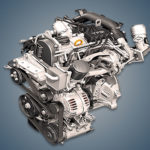The 1.6-liter injection engine Volkswagen BCB 16v was produced from 2001 to 2006 and was installed on the Golf 4 model, as well as its counterparts such as Bora, Seat Toledo or Leon. This power unit is essentially an analogue of the AZD engine with an updated exhaust system.
The EA111-1.6 series includes: ABU, AEE, AUS, AZD, BCB, BTS, CFNA, CFNB.
Specifications
| Production years | 2001-2006 |
| Displacement, cc | 1598 |
| Fuel system | injector |
| Power output, hp | 105 |
| Torque output, Nm | 148 |
| Cylinder block | cast iron R4 |
| Block head | aluminum 16v |
| Cylinder bore, mm | 76.5 |
| Piston stroke, mm | 86.9 |
| Compression ratio | 11.5 |
| Features | DOHC |
| Hydraulic lifters | yes |
| Timing drive | belt |
| Phase regulator | no |
| Turbocharging | no |
| Recommended engine oil | 5W-30 |
| Engine oil capacity, liter | 4.5 |
| Fuel type | petrol |
| Euro standards | EURO 4 |
| Fuel consumption, L/100 km (for VW Golf 4 2002) — city — highway — combined |
9.8 5.5 7.1 |
| Engine lifespan, km | ~330 000 |
The engine was installed on:
- Volkswagen Bora 1 (1J) in 2001 – 2005;
- Volkswagen Golf 4 (1J) in 2001 – 2003;
- Seat Leon 1 (1M) in 2001 – 2006;
- Seat Toledo 2 (1M) in 2001 – 2004.
Disadvantages of the VW BCB engine
- Floating engine speed usually causes contamination of the throttle or EGR valve.
- Often there are leaks in the cooling system, pipes and a thermostat are leaking here.
- Replacing timing belts is very expensive, and when it breaks, the valves always bend.
- Ignition coils, lambda probes and a coolant temperature sensor are also famous for their low reliability.






